Some of the best open source B2B eCommerce platforms are Magento Open Source, WooCommerce, OroCommerce, Shopware, Prestashop, Spree Commerce, Drupal Commerce, OpenCart, X-Cart, Broadleaf Commerce, and nopCommerce.
In this guide, you will find a full comparison between these open-source eCommerce platforms, with real user reviews, to help B2B brands of all sizes evaluate and choose a platform best for their needs and future goals.
Disclaimer: The information below is accurate as of November 19, 2025.
Best B2B Open Source eCommerce Platform: Comparison Table (With Features & Pricing)
In a subset of B2B eCommerce platforms, we have those platforms that are open-source, meaning the eCommerce software is free to download as source code, with the option to modify and redistribute it.
The following are the top B2B open-source commerce platforms and their key features, for quick comparison:
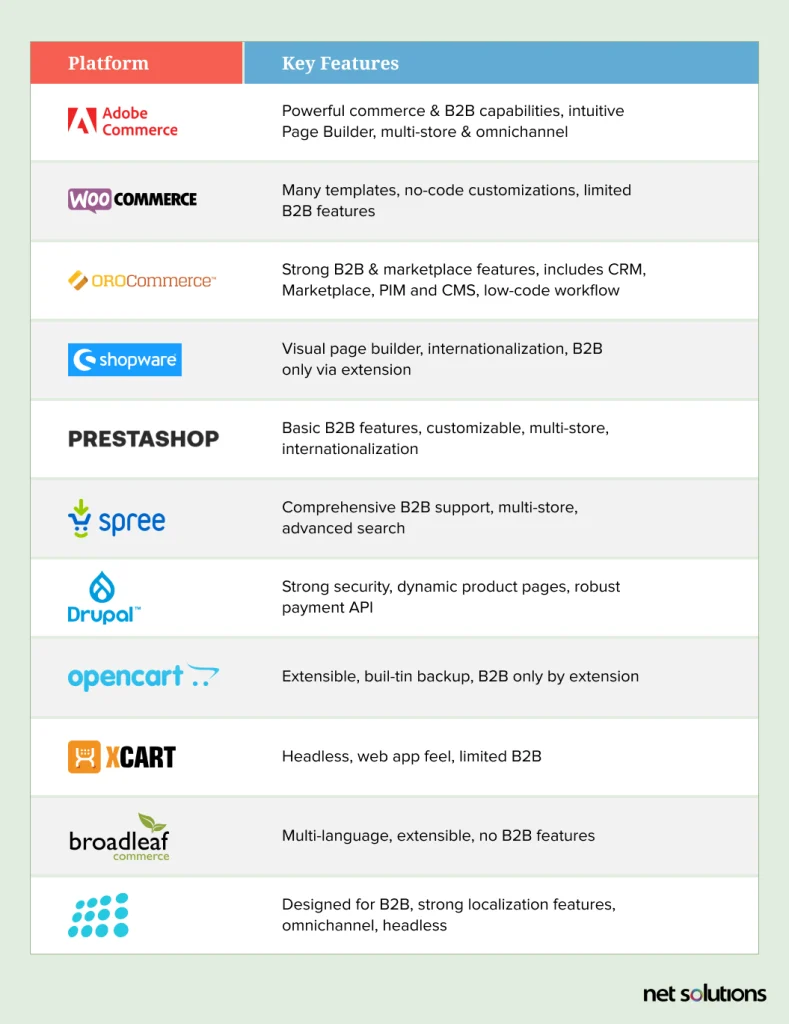
Next, we’ll examine these platforms by use case.
The Best B2B Open Source eCommerce Platforms by Use Case
Before diving into each platform in depth, let’s have a quick look at the top use cases of each of our listed open-source digital commerce platforms:
- Magento Open Source – Best for high customization and scalability
- WooCommerce – Best for WordPress users or small businesses just starting up in eCommerce who want a no-code solution
- OroCommerce – Best for medium to large B2B sellers looking for minimal set-up time or development
- Shopware – Best for small B2B sellers who do not need advanced B2B features, with a strong presence in European countries
- PrestaShop – Best for cost-conscious or newer sellers who want a simple solution
- Spree Commerce – Best for B2B sellers looking for a flexible, headless commerce solution to have more flexibility for omnichannel sales
- Drupal Commerce – Best for Drupal users or security-conscious non-profits, companies or governments looking for a scalable solution
- OpenCart – Best for EU or US customers looking for a simple eCommerce solution who don’t mind a heavy use of third-party extensions
- X-Cart – Best for brands that do not require specific features in quoting, invoicing or self-service portals.
- Broadleaf Commerce – Best for brands who want composable architecture and multi-site setups.
- nopCommerce – Best for small to enterprise B2B brands that want a full-featured platform
- Mailchimp Open Commerce – Best for small businesses who only need basic commerce features.
When it comes time to actually choosing a platform, the decision varies greatly on the challenges your B2B eCommerce business faces and your goals. While there are some obvious benefits to B2B eCommerce and some B2B eCommerce trends that can guide your decision (e.g. the trend toward headless commerce), the decision on which platform to choose is very personal.
If you have decided that an open-source platform is right for your B2B eCommerce website development (due to cost, flexibility, or control factors), here are some of our top choices in depth:
1. Magento Open Source
Magento Open Source is a code base that Adobe officially contributes to as a starter for businesses who may one day transition to its more premium, feature-rich licensed product, Adobe Commerce. Magento Open Source provides the tools necessary to build digital storefront(s) across channels and businesses (B2C and B2B).

Magento Open Source is not designed for B2B by default, but requires the use of an extension (free and paid). Adobe (current owner of Magento) has made its own B2B extension as exclusive to its licensed Adobe Commerce platform, which is available on-premise or on cloud.
Who Is Magento Open Source Best For?
Magento Open Source is designed to support developers and small businesses who need a highly customizable platform and who need a secure, scalable platform.
Magento Open Source Features
- Personalization tools
- Page Builder, an Intuitive drag-and-drop interface for content creation
- Marketing tools including discounts, coupon codes, product reviews
- B2B capabilities for partner management, contract pricing, invoicing, multi-source inventory management, flexible checkout
- Multi-store and omnichannel capabilities
- Extensible with a robust marketplace
Magento Open Source Pros and Cons (According to G2 Reviews)
From user reviews using Magento Open Source, and specifically some B2B feedback:
Pros:
- Broad array of features available – Adrianna T.
- Default theme is great to start with – Falgun U.
- Extensive customization options, especially for technical users – Deepak M.
- Strong multi-store capabilities with a single admin interface – Ghanshyam T.
Cons:
- Meeting the base requirements for the server can be costly, with resource use – Falgun U ., Deepak M.
- Requires highly experienced developers – Ryan Patrick V.
- Complexity and need for experienced developers can lead to high cost of development – Ghanshyam T.
2. WooCommerce
WooCommerce is an open-source platform that’s essentially a plugin for the open-source content management system (CMS) WordPress. B2B sales are not default for WooCommerce, but need to be supported by an additional (paid) extension such as B2B for WooCommerce or B2BWoo.
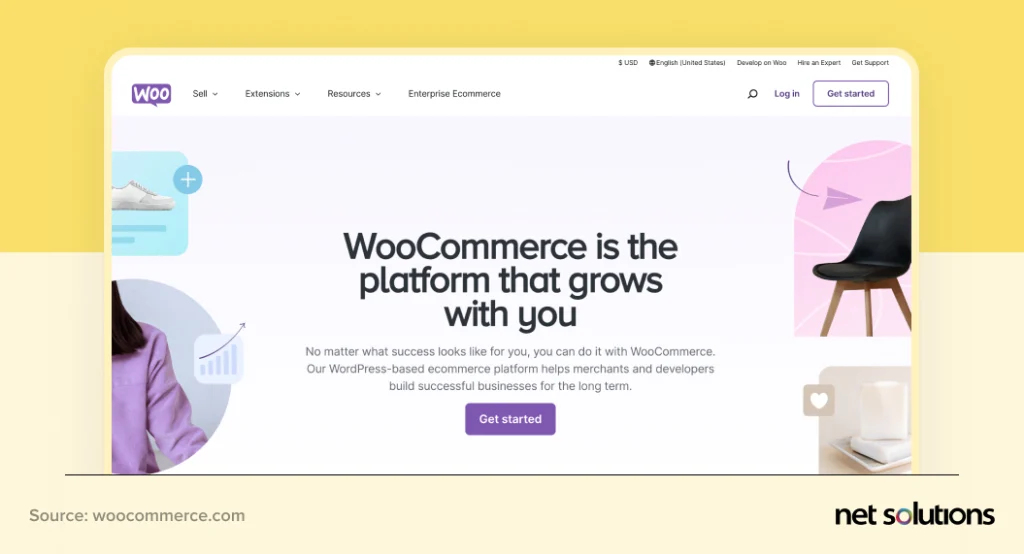
As a WordPress-based commerce platform, WooCommerce supports over 4.8 million online stores. WooCommerce relies on extensions for many core functions, including for WooPayments, WooCommerce Subscriptions and more.
Who Is WooCommerce Best For?
WooCommerce is ideal for WordPress web developers and smaller brands to start and scale an online store using no-code tools. For B2B brands, it may not offer quite the same comprehensive features as other B2B eCommerce platforms, but is a much more cost-effective solution.
WooCommerce Features
- Lots of templates available in the marketplace
- New Block Theme elements offer optimal user experience, making it easy to customize catalogs, promote products or optimize checkout in a no-code format
- Through extension, gain support for quotes, quick orders, live search, access roles, customized pricing
- Manage your store from the free WooCommerce app
WooCommerce Pros and Cons (According to G2 Reviews)
Since you have choice in WooCommerce B2B extension, these reviews are for the standard WooCommerce core, filtered in relevant B2B feedback as it is available:
Pros:
- Easy, intuitive, and fast for developers and to teach storeowners – Jim N.
- The ability to gain access (via extension) to B2B features without recurring fees – goods & jewelry user
- Almost any issue can be solved by a plugin or the strong developer community – Sergio A.
- The best no-code option for eCommerce – Francesco G.
Cons:
- B2B capabilities are not by default – Sergio A.
- Sometimes plugins may not work well together – Marcos T.
- Customization requires hooks and many plugins, so it can bloat a site – Rishab J.
- The cost of extensions quickly adds up – Francesco G.
3. OroCommerce
OroCommerce is B2B commerce platform that supports complex sales for manufacturers, wholesalers and distributors (or any other kind of scenario).
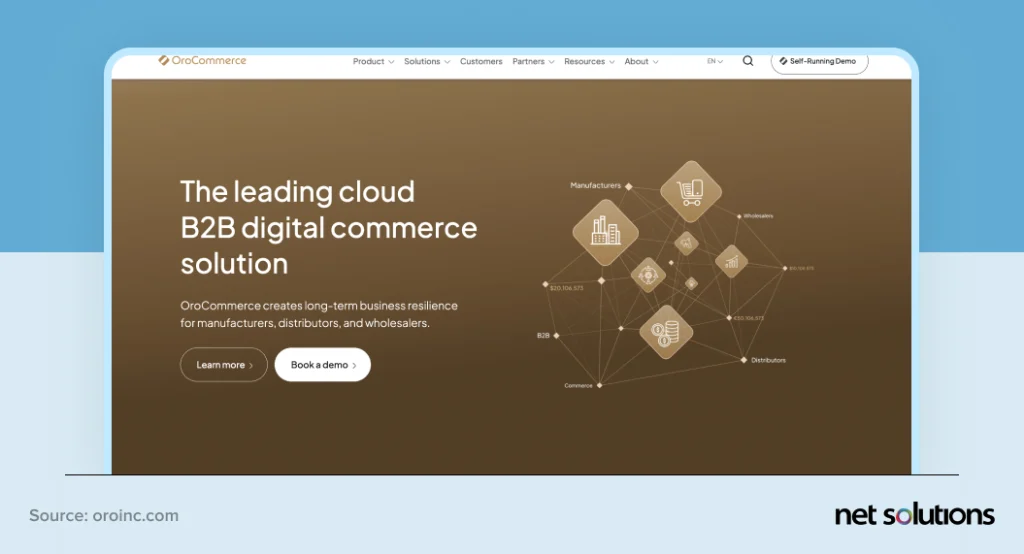
OroCommerce includes a CRM as well as a marketplace solution (where it started).
Who Is OroCommerce Best For?
OroCommerce is a simple platform designed for medium to large B2B businesses who want very little setup or management time.
OroCommerce Features
- Includes eCommerce, CRM, Marketplace, PIM and CMS
- B2B features include: quoting, self-service, quote-to-order portals, custom pricing and product catalogs
- Strong marketplace management software with centralized inventory management, easy vendor onboarding, branded storefronts, order management and fulfillment tools
- Low-code workflow automation
- Available on-premise (open-source) or cloud-based (paid)
OroCommerce Pros and Cons (According to G2 Reviews)
From reviews on G2, OroCommerce is known for:
Pros:
- Impressive functionality and workflow tools – Jenn S.
- Strong customer support – Jyotirmaya S.
- The best marketplace management platform – Salman M.
Cons:
4. Shopware
Shopware is a headless B2B eCommerce platform created on Symfony and Vue.js, available both as an open-source product or as a packaged service.
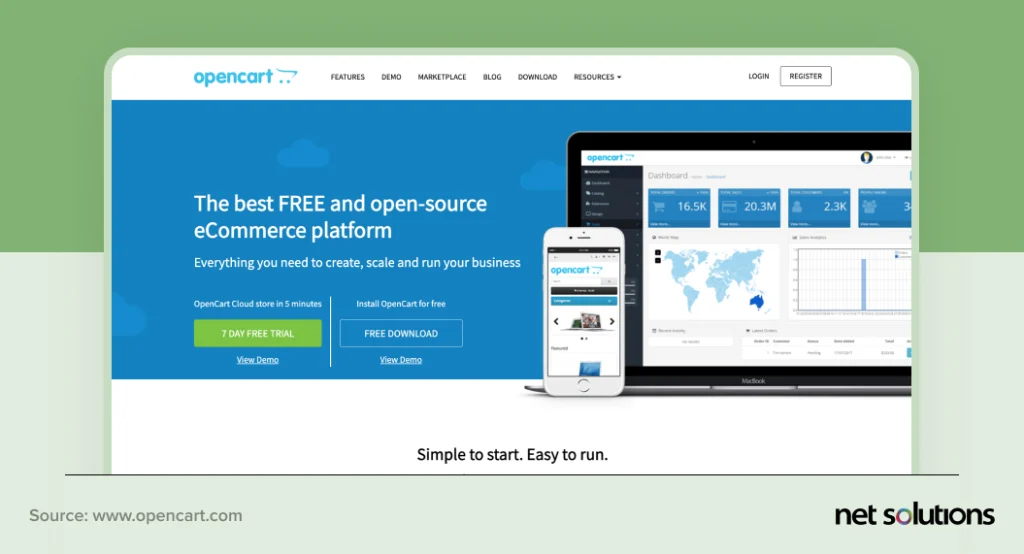
The community edition of Shopware supports basic B2B functions by default, but its more comprehensive B2B editions (the no-code B2B Suite or the composable B2B Components) are exclusive to its hosted products.
Who Is Shopware Best For?
Due to the limitations of features in its community edition, Shopware is ideal for smaller B2B brands or B2B sellers who have very few products to sell. Shopware is well-known in European countries.
Shopware Features
- Visual page builder
- Basic search & filtering
- Internationalization
- Product reviews
- Rule-based and scaled pricing
B2B features can be extended through the use of Shopware extensions (free and paid).
Shopware Pros and Cons (According to G2 Reviews)
These reviews represent the overall impression for Shopware, with some filtered results related to the community edition.
Pros:
- Extensive documentation to support the community edition – Christian S.
- Seamless internationalization – Christian S.
- Very intuitive interface – Philip G.
Cons:
- Many extensions are SaaS, which can contribute to cost increases – Christian S.
- Many basic functions need to be supported by extensions – Christian G.
- Multi-store capabilities are not available without a license – Jurgen H.
- Analytics are not available – Anna Christina R.
5. PrestaShop
PrestaShop is a customizable eCommerce platform, available as open-source under “PrestaShop Project.” PrestaShop is an eCommerce platform written in PHP, offering strong multi-store and internationalization capabilities.

PrestaShop has a basic B2B mode that offers simple features, but requires the use of third party modules (extensions) to enable broader B2B capabilities. Some of these B2B modules are available for a one-time fee (not SaaS).
Who Is PrestaShop Best For?
PrestaShop offers basic, simple eCommerce functionalities, ideally suited to brands that have limited SKUs that want to sell internationally.
PrestaShop Features
- Multi-store capabilities
- Strong internationalization capabilities (currency, tax, language)
- B2B features include larger customer profiles, variable pricing, invoices, support for account balances
- The ability to customize PrestaShop modules at set-up (100 to choose from) or via extension (4,000 in marketplace).
- Discounts, cross-selling capabilities
PrestaShop Pros and Cons (According to G2 Reviews)
These reviews represent the overall impression for PrestaShop, with some filtered results related to the community edition.
Pros:
- Highly customizable to any kind of eCommerce shop due to modules and templates – Levi A.
- Can be run on a variety of server OS – Eduardo B.
- Very helpful and easy to use for new merchants – Guatam K.
- Easy to implement new themes or features – Tasawer K.
Cons:
6. Spree Commerce
Spree Commerce is a headless open-source eCommerce platform that supports multi-store and B2B out-of-the-box.
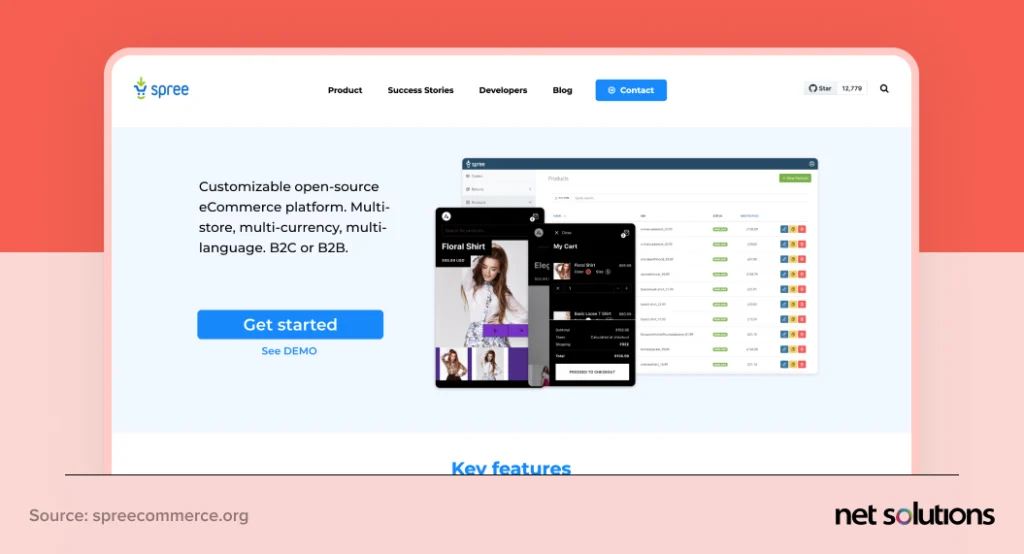
Spree Commerce offers comprehensive features to support B2B ecosystems and complex supply chains. Spree uses Bootstrap to offer reusable components to simplify the development and maintenance of the online store.
Who Is Spree Commerce Best For?
Spree Commerce is ideal for small or large B2B sellers looking for a flexible solution that can support a standard web storefront, progressive web app (PWA), or be used as a headless commerce platform to support omnichannel sales.
Spree Commerce Features
- Multi-store support
- B2B pricing, purchasing and payments including role-based access controls for buying authority, variable pricing, discounts, various payment methods
- Comes with a default storefront, with support for headless with pre-built integrations for Next.js Commerce and Vue Storefront
- Product recommendations and advanced search
- Multi-currency, multi-language support
Spree Commerce Pros and Cons (According to G2 Reviews)
Spree Commerce is known for:
Pros:
- Includes all the basic features for admin and buyers – Brian G.
- Shows transparency over live carts – Automotive user.
Cons:
- Search can get bogged down with large products or customer databases – Automotive user.
- Documentation is difficult to follow – Nicholas D.
- Personalization of the default store is complex – Brian G.
7. Drupal Commerce
Drupal Commerce is a module of Drupal, a free and open-source content management system (CMS), the backend of 16% of the top 10,000 websites that use open-source technology. The Commerce module adds functionality specific to eCommerce.
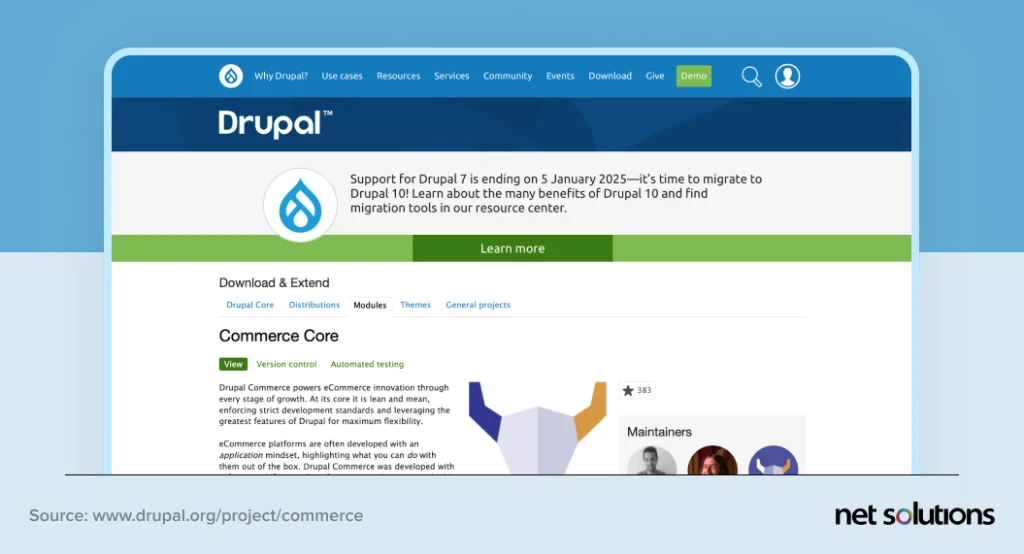
Drupal Commerce was created with a “framework first mindset”, focused less on what you can do and more on what you can build, supporting greater flexibility and scalability.
Who Is Drupal Commerce Best For?
Drupal Commerce is best for existing Drupal users or developers or for brands with developer resources looking for a scalable, future-proof solution for a content-heavy or security-conscious website. Drupal is often leveraged by governments and nonprofits.
Drupal Commerce Features
- Dynamic product pages
- Customized checkout flows for different order types
- Robust payment API, supporting 100+ payment gateways
- Promotions & coupons
- Localization support
- Can further be extended by other Drupal modules for Shipping, Stock, Recurring and more.
Drupal Commerce Pros and Cons (According to G2 Reviews)
According to G2 reviews, here are some things people like and dislike about Drupal Commerce.
Pros:
- Feature-rich – Rakesh B.
- Strong built-in translations – Vishwanath M.
- Strong security – Gaurav.
- Strong community support – Akash K.
Cons:
- Any site will require extensive setup and customization – Akash K.
- The learning curve is high, as it’s very different from other CMS platforms – Akash K.
- Updating can be a headache – Vishwanath M.
- There are few options for templates or “pre-done coding” – Stacy C.
8. OpenCart
OpenCart is an eCommerce platform available as open-source or hosted on the cloud, powering over 471k eCommerce stores around the world.

OpenCart relies on paid modules (here’s an example) to support B2B functionality for marketplaces or wholesale sellers.
Who Is OpenCart Best For?
For simple B2B sellers in either the US or EU who don’t mind using an extension to get B2B features.
OpenCart Features
- Over 13,000 modules and themes to expand your store and capabilities
- Multi-store support
- Discounts, coupons, reward program support
- Built-in backup system
OpenCart Pros and Cons (According to G2 Reviews)
OpenCart is known for:
Pros:
- Easy to implement, configure and use – Martin A.
- Extensibility through OCMods and themes make it a “no-brainer” for any eCommerce store – Jeff M.
- Active community support – Retail users
- Lighter on code than other platform options – Sean O.
Cons:
9. X-Cart
X-Cart is an eCommerce platform that boasts 20+ years of building online stores, available both as open-source and as a platform or automotive business solution.
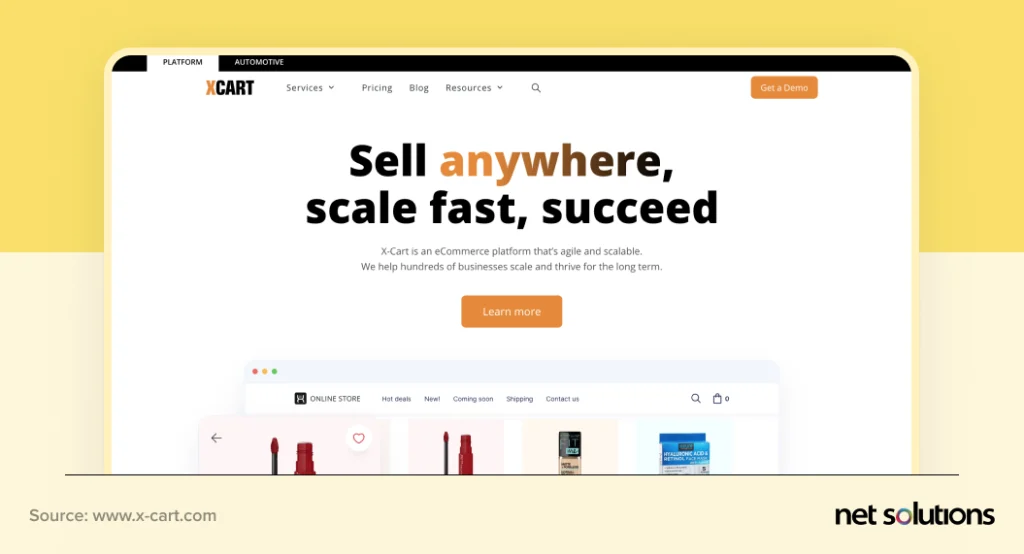
The API-driven X-Cart is highly adaptable and scalable, but dedicated B2B capabilities are available only for its platform solution.
Who Is X-Cart Best For?
Due to the limited availability of B2B capabilities for its open-source solution, X-Cart is best for brands that do not require specialized pricing, invoicing or other standard B2B features.
X-Cart Features
- Storefront API supports custom storefronts (headless capability)
- Demo storefront built in Next.js has the feel of a web app
- Can support large numbers of SKUs
X-Cart Pros and Cons (According to G2 Reviews)
X-Cart is known for:
Pros:
- Lots of available apps – Hospital & health user.
- Very strong SEO – Jeff G.
- The knowledge base is very comprehensive and searchable – Teresa A.
Cons:
- Requires a developer to customize or extend – Anshuman K.
- Limited reporting capabilities – Doug B.
10. Broadleaf Commerce
Broadleaf Commerce is a headless, composable commerce solution that supports multi-site commerce, purpose built to support complex commerce, available open-source or commercially in various editions.
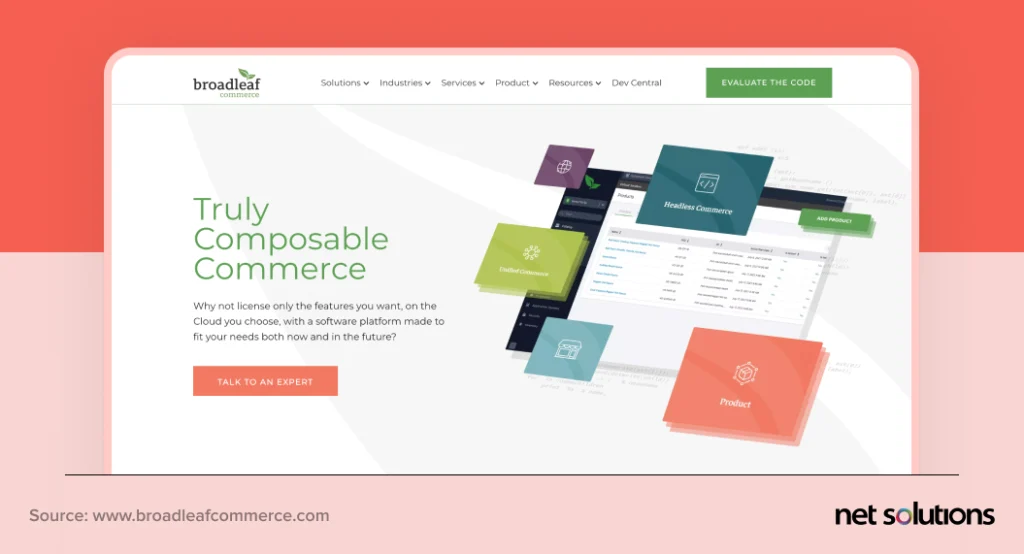
A Java platform based on Spring Framework, the Community Edition includes standard eCommerce capabilities. The B2B Edition requires an enterprise license.
Who Is Broadleaf Commerce Best For?
Broadleaf Commerce is ideal for developers or small B2B brands who want a fully composable solution with extensibility and multi-site capabilities.
Broadleaf Commerce Features
- Basic commerce features designed for small business needs
- Very adaptable and extensible with modular framework
- Multi-currency, multi-language support
- B2B capabilities (paid): account management, account specific pricing, custom catalogs, quick reorders, bulk ordering, personalization
Broadleaf Commerce Pros and Cons (According to G2 Reviews)
Broadleaf Commerce is known for:
Pros:
- International market features (currencies, languages) – Aman K.
- Modern, microservices architecture – IT user
Cons:
- Small community and incomplete documentation – Aman K.
- Integrations can be lengthy – Customer Service user
11. nopCommerce
nopCommerce is a commerce platform primarily designed for B2B (though it supports B2C), setting it up as having rich built-in B2B commerce features.
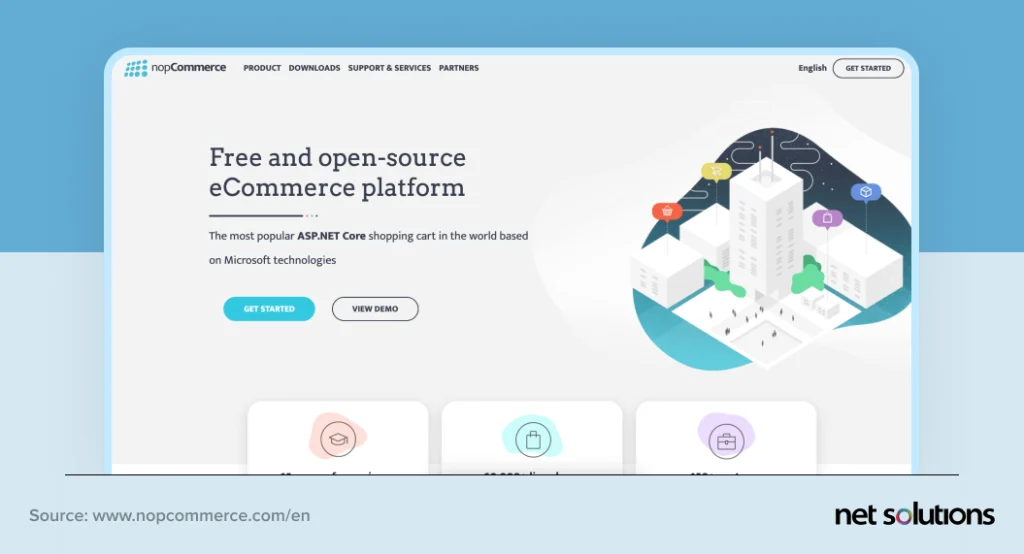
nopCommerce is based on ASP.NET, designed to support global brands, with support for multi-currency, international payment systems, global e-shopping and localized taxes.
Who Is nopCommerce Best For?
Best for small to enterprise B2B brands that want a full-featured platform to support global sales.
nopCommerce Features
- Standard B2B features for checkout, marketing, payment, shipping, and tax
- Strong localization features
- Multi-store, omnichannel capabilities
- Headless commerce support using the Web API plugin (add-on cost)
nopCommerce Pros and Cons (According to G2 Reviews)
nopCommerce is known to support B2B sales globally, with sellers saying:
Pros:
- Lots of built-in features – Damian S.
- User friendly, easy to use – Farrukh F.
- Strong architecture with regular upgrades – Computer software user
Cons:
What Are B2B Open Source eCommerce Platforms?
A business-to-business or B2B eCommerce platforms designed to support B2B sellers (suppliers and producers, wholesalers & distributors, service or software sellers) in selling their products or services to other businesses. An B2B open-source eCommerce platform is a software that is available under an open-source license or community license that grants the user of the software the ability to download, use, and modify the software (per the terms of the specific license).
Open-source eCommerce platforms are free to download, but come with added overhead and cost related to the need for skilled developers to set up, maintain and secure the sites and any additional costs related to the technology stack (hosting, security, domain, integrations, etc).
What is a self-hosted eCommerce platform?
A self-hosted eCommerce platform is a platform that you host on your own server, giving you more control but coming with increased responsibilities over the hosting. A self-hosted eCommerce platform can still be licensed (e.g. Adobe Commerce on-premise) or open-source.
The opposite of a self-hosted platform would be cloud-hosted, typically software-as-a-service (SaaS) or platform-as-a-service (PaaS) offerings in eCommerce.
Open source vs. SaaS ecommerce platforms
When it comes to choosing an eCommerce platform, there are pros and cons to both open-source and software-as-a-service (hosted in the cloud).
| Open-Source | SaaS | |
|---|---|---|
| Control | Most control
Full control over hosting and data |
Least control
No control over hosting, data is cloud-hosted and protected with shared responsibilities |
| Responsibilities | B2B users assume full responsibility for setup, customization, integrations, security, management | The cloud provider manages infrastructure (though potentially not headless front-ends) |
| Functionality | Highly customizable, can be tailored to specific needs with access to source code. | Often includes far more comprehensive features, particularly for B2B. Limited customization compared to open-source. |
| Resource requirements | Requires in-house developers or the support of a contracted partner
Lower in initial cost, but infrastructure and development costs can be significant |
Lower developer requirements, adjusted to integrations or customizations only.
Subscription-based model with potential tie to sales. Includes support. |
| Security | Managed by the B2B store owner. | Managed by the cloud provider. |
What Are the Advantages of B2B Open Source eCommerce Platforms?
Open-source commerce platforms give B2B brands:
- Full control over the code to create new features, accommodate complex needs
- Full control over data and hosting
- Often robust community support
- Effective control over costs
What Are the Challenges of B2B eCommerce Open Source Software?
While there are obvious benefits to an open-source B2B eCommerce platform, there are also challenges:
- Lack of support for time-sensitive issues
- Requires ongoing support from developers
- May introduce additional complexity for non-technical users
- Full security responsibility
- May not come with all the features you need
- Expenses can add up with hosting, third-party integrations, custom features or integrations, security, development time and costs
If you’re fully informed about the pros and cons of open-source, how do you make a choice?
How to Choose the Right B2B eCommerce Open Source Platform for Your Business
In this guide, we have attempted to provide an unbiased look at various open-source eCommerce platforms and their suitability for supporting your B2B business—but how can you choose? We suggest you consider the following in helping guide your analysis of each platform:
- What channels do your customers currently or want to engage with you on? Look carefully at your site analytics and survey your buyers to ask about their customer experience
- Do you sell in one geographic region, or many?
- Do you have a large inventory?
- Do you offer differentiated pricing for different customers, segments or industries?
- Do your customers want a self-service portal?
- How are you handling inventory, orders and fulfillment? Do you need to integrate with external software (ERP, inventory management, CRM), support bulk orders, ship from multiple warehouses?
- Do you need to offer quotes or multiple payment options?
- Do you have a development team or an experienced partner to assist in deployment and maintenance?
By answering the above, you can begin to rule out some B2B platforms in favor of others. When it comes down to the final choice, a lot comes down to personal preference: the language your developers prefer, the way you feel about the user interface, and perhaps some of the case studies that speak to challenges you also experience.
The Bottom Line
We hope this guide has given you a comprehensive overview of the available B2B eCommerce platforms that are open-source, their pros and cons, and what real users think.
If you are interested in launching an eCommerce store or replatforming to another platform and think that one of these open-source platforms is right for you, Net Solutions offers comprehensive eCommerce development services to help compile your tech stack, design your storefront(s), and maintain your eCommerce site well into the future.
SHARE THIS POST
Table of Contents
Related Resources
- AI in B2B eCommerce: Everything You Need to Know
- Top 14 B2B eCommerce Benefits in 2025
- The B2B eCommerce Catalog: Everything You Need to Know
- The Biggest B2B eCommerce Challenges (And How to Address Them)
- The Ultimate Guide to B2B Fashion eCommerce: Strategies, Trends, and Solutions
- 18 Must-Have B2B eCommerce Features To Look For in 2025
- Headless B2B eCommerce - How to Redefine Your Business
- B2B eCommerce Marketplaces: Your In-Depth Guide
- Top B2B eCommerce Metrics to Track for Success [2025]
- B2B Mobile eCommerce - A Comprehensive Guide
- Why Your Business Needs a B2B eCommerce Mobile App
- B2B eCommerce Platform Costs: A Comprehensive Guide (2025)
- 12 Top B2B eCommerce Platforms for 2025 [With Real Reviews]
- B2B eCommerce Pricing Strategies: An In-Depth Guide
- Your In-Depth Guide to B2B eCommerce Replatforming
- Top 9 B2B eCommerce Trends to Watch in 2025
- B2B eCommerce UX: A Comprehensive Guide
- A Step-by-step Guide to B2B eCommerce Website Development
- 9 of the Best B2B eCommerce Website Examples in 2025

